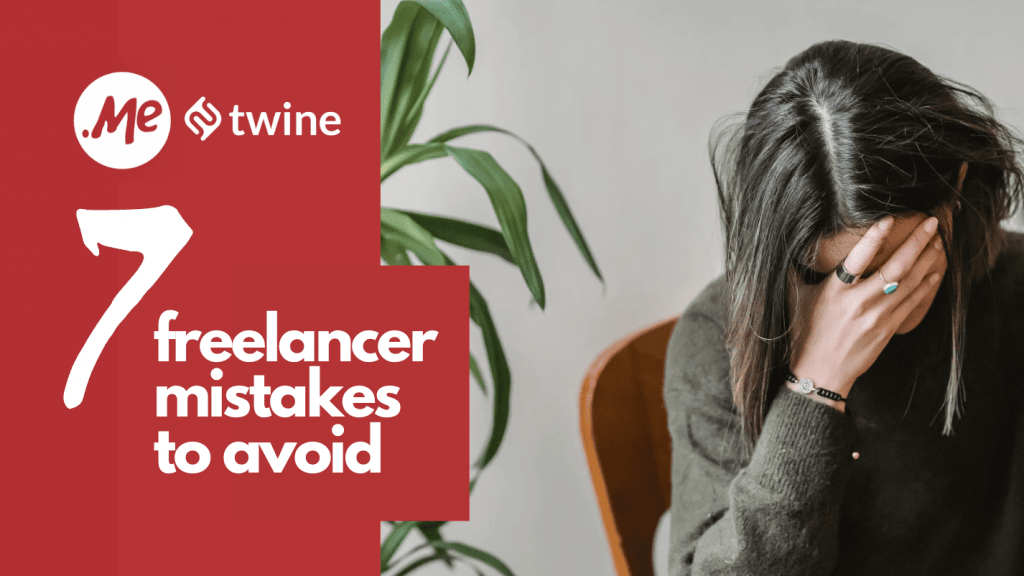
They say that career mistakes make for great learning experiences. But let’s face it: while they may be educational, they are never fun. What if you could learn something without having to slip up yourself? Well, that’s a far better route.
This is especially true when it comes to freelancing. As glamorous as some people make the freelance lifestyle seem, the road can get rocky at times. In other words, we all have had our fair share of trial and error.
Fortunately, learning from the career mistakes of others can be just as enlightening (not to mention far less embarrassing). With that in mind, the following article aims to highlight common mistakes freelancers make and how to avoid them.
Rookie Freelancer Mistakes #1: Being known as Jack of all Trades (but Master of None)

I have to admit, at the start of my freelance career, I was hesitant to pick a niche because I didn’t want to put myself out of a job. I wanted to have the freedom to say yes to anyone and any project without being confined to WHO I could work for and WHAT I could do for them.
In the end, this meant that I ended up doing a really broad mix of things for clients in pretty much every sector. And, while I enjoyed some of the projects, there were far more that I did NOT enjoy. But the biggest downside was that I couldn’t make a name for myself doing anything because I didn’t do enough of any one thing.
The fight between the generalist and the specialist will probably never stop. But here’s the deal: the world is more connected than ever. People have more choices than ever. The difference between you and your competitors had better be compelling or you’ll never stand out.
When you avoid specialization, you miss out on an easy opportunity to cut out almost all of your competitors. If you’re constantly bidding on projects against other people with similar credentials, you’re inevitably going to have to bid on projects based on price instead of value.
Rookie Freelancer Mistakes #2: Letting your marketing go when times are good

Marketing is essential to building up a successful freelance career. Unfortunately, most people tend to neglect it once the contracts start coming in. This is a big mistake for any job and a mistake freelancers make again and again. Marketing should be done at all times, the good or the bad.
To avoid this mistake you should always work on your online presence. Standing out should be a priority for freelancers and the best way to do that is to with your own personal website. That way you can easily show potential clients what your body of work is all about.
What you need to do is:
1. Build your personal website
2. Showcase your best work
3. Update it regularly.
Here’s a tip: Get a personal domain name
Choosing a domain name for your personal website is an important decision you’ll have to make. Investing in a personalized domain name is critical to owning the search results that come up when someone Googles your name. Remember, potential clients and employers will do their research. Having a personalized domain that links to your personal website will enable you to own the results that come up when anyone searches your name.
Choose a personalized domain name that speaks to who you are. We’d opt for .ME, a trusted domain extension that many creatives from across the world have already chosen as their online home. .ME allows you to brand your website, blog, or portfolio with a domain name that is as unique as you!
Rookie Freelancer Mistakes #3: Setting your rates too low (or too high)

Setting a price for your services is intimidating. If it’s too high you’ll lose the client, and if it’s too low you won’t be able to pay the bills. How are you supposed to know what to charge? Well, this is a common problem and one of the mistakes freelancers make repeatedly.
As a general rule, try to set your price by project, not by an hourly rate. If you’re charging by the hour, you’re making less than your service is worth. Just because a project only takes you a few hours, that doesn’t mean a client is getting less value from it. Customers are paying you for the work, not the time.
Finally, once you’re working as a freelancer for some time, don’t be afraid to take another look at your rates, revise them, and negotiate accordingly – especially when you take new freelance jobs. If you continued to work for someone else, you’d hope to get a raise at some point. Don’t neglect to give yourself the same consideration once you’re your own boss.
Rookie Freelancer Mistakes #4: Poor time management

Positive of being a freelancer: no one tells you what to do!
Negative of being a freelancer: no one tells you what to do…
When you work for yourself, it’s up to you to do the work. That may sound simple, but it can be a blessing and a curse. Poor time management is one of the most common mistakes freelancers make.
The truth is, there is no secret formula that will make you productive with a snap of a finger, it is all up to you. Getting organized is the first step to improving your time management skills as a freelancer.
Keeping everything organized will be immensely helpful if you want to waste less time looking through the piles of paper on your desk and more time on actually building your career. Whether it’s about managing your finances, invoices, job offers, or actual work you have to do, having essential freelance tools and resources at your disposal will save you a lot of time.
Rookie Freelancer Mistakes #5: Working without a contract (or with a bad contract)

It’s happened time and time again. A freelancer connects with a client. The client seems trustworthy. The freelancer and the client come to a verbal agreement on services and price. The freelancer does the work. The client pays less than what was agreed upon. And there’s nothing the freelancer can (realistically) do.
Being too trusting can be the downfall of a good freelancer. It’s human nature, but it’s not good for business. Have your clients sign a services agreement or contract before you get started on the work, so you have a paper trail to point back to and legal rights to the money you’re owed.
Furthermore, contracts exist to define expectations on both sides, keep honest people honest, and make sure that there are no surprises down the road.
That extra step and all of that legal jargon may seem like it’s not worth your while. However, a contract can offer so much protection to you as a freelancer. Whether a client skips out on paying you, or the scope of work begins to snowball out of control, having that signed document in your corner will be a tremendous asset.
Rookie Freelancer Mistakes #6: Neglecting networking

Networking plays a key role for any freelancer as it helps you build a network with other contacts. In the long run that gives you a huge advantage as a professional.
Networking with other freelancers isn’t a competition, it’s a collaboration
You might have read my headline and thought “well, that’s dumb, wouldn’t other freelancers in your niche be competition for you?”. Sometimes that might be the case, but what I’ve found is mostly the opposite.
For a start, you’ll have a hard time finding other freelancers who have the same experience levels as you in the same niche(s). As a result, you can benefit from the insight of those with more experience than you, and lend a hand to those with less.
These kinds of reciprocal relationships in your network form strong bonds, especially giving help and advice to others without the expectation of ‘you owe me one’.
As a bonus, when you’re nice to people without ulterior motives, you’ll often find you’re the first person they think of when passing on client leads and opportunities anyway.
Rookie Freelancer Mistakes #7: No ‘Rainy Day’ fund

In the face of unexpected car repairs, medical bills, and sudden job loss, having an emergency fund serves as the first line of defense against the ups and downs of life.
Most finance experts will tell you that you need three to six months’ worth of living expenses in savings as a ‘rainy day’ fund, even if you aren’t planning on starting your own freelancing business. If you are going out on your own, you’ll need to add startup costs to that figure.
When determining the actual amount to save, take into consideration the essential expenses that would need to be covered in case of a sudden loss of income. This may include: rent, utilities, groceries, gas, and health insurance.
You’ll notice that things like Netflix subscriptions and money for take-out food aren’t included in the list above. While these things are nice to have, when it comes down to it, they aren’t essential. Trust me, if you lose your job, you’ll have much bigger things to worry about than being able to binge The Office for the third time.
Fortunately, if you’re freelancing and don’t plan on having any employees for the moment, you won’t need to worry about paying wages or (most likely) renting office space.
The Key Takeaway
The key to avoiding these common mistakes freelancers make is being aware of them.
Whether you’re just getting started or have been freelancing for a while, there are plenty of mistakes you’ll make. But at the very least, you can learn from the freelancers who have come before you and (hopefully) avoid some of these for yourself.
Ready to get hired? At Twine, we have dozens of top-quality jobs being posted each and every day. From design to marketing, development to copywriting – there’s a job ready for your skills. Join the marketplace of diverse creative talent here.



